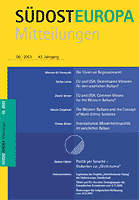The Western Balkans and the Concept of Multi-Ethnic Societies: Progress and Challenges
The Western Balkans and the Concept of Multi-Ethnic Societies: Progress and Challenges
Author(s): Marcin CzaplińskiSubject(s): Politics / Political Sciences
Published by: Südosteuropa Gesellschaft e.V.
Keywords: Western Balkans; Tetovo; nationalism; corruption
Summary/Abstract: With a new generation of politicians having come into power in the Western Balkans a lot of progress has been achieved concerning interethnic relations. Legislation has been introduced to protect the rights of persons belonging to national minorities. Education is a key issue for securing equal opportunities. Here, the opening of the South East European University in Tetovo is a successful example. The needs and interests of national minorities can be addressed by de-centralising power through introducing and implementing minority rights also on the local level, targeting financial support to disadvantaged areas, building good regional relations. Some of the challenges that remain are the link between crime and conflict and extreme nationalism that is often used as a cover to mask corruption. According to the author, everything should be done to prevent the region from becoming “a European black-hole”. Although emerging prospects for EU membership can play a crucial role as a catalyst for transformation, EU enlargement will not bring with it the end of ethnic tensions. An increasing delegation of responsibility to the states themselves is required as ultimately the fate of the region lies in the hands of its own people.
Journal: Südosteuropa Mitteilungen
- Issue Year: 2003
- Issue No: 06
- Page Range: 26-31
- Page Count: 6
- Language: English
- Content File-PDF

